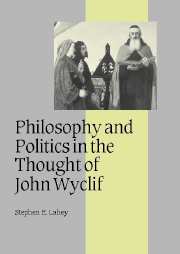Book contents
- Frontmatter
- Contents
- Acknowledgements
- Abbreviations
- 1 The historiography of Wyclif's dominium thought
- 2 Why dominium?
- 3 Wyclif's realism and divine dominium
- 4 Proprietas in Wyclif's theory of dominium
- 5 Iurisdictio in civil dominium
- 6 On kingship
- 7 Conclusion
- Bibliography
- Index
- Cambridge Studies in Medieval Life and Thought Fourth series
2 - Why dominium?
Published online by Cambridge University Press: 30 July 2009
- Frontmatter
- Contents
- Acknowledgements
- Abbreviations
- 1 The historiography of Wyclif's dominium thought
- 2 Why dominium?
- 3 Wyclif's realism and divine dominium
- 4 Proprietas in Wyclif's theory of dominium
- 5 Iurisdictio in civil dominium
- 6 On kingship
- 7 Conclusion
- Bibliography
- Index
- Cambridge Studies in Medieval Life and Thought Fourth series
Summary
By the mid-twelfth century the revival of Roman law and canon law allowed philosophers to define rulership in terms of “power,” “authority,” “imperium,” and “jurisdiction” without addressing problems about use and possession of private property. Similarly, Roman law had long provided civil and canon lawyers with careful distinctions about ownership issues, to which the term dominium had usually applied. Why unite ownership and jurisdiction, making dominium into a portmanteau concept? Janet Coleman argues that the term's use in reference to proprietas and iurisdictio was attributable to two factors. First, economic conditions were moving from traditional feudal modes in which credit and other techniques of payment were of less import to conditions which favored an increasing reliance on hard currency. As the accumulation of large amounts of money became possible, so did a revulsion to avarice, she argues, and so the thirteenth century saw the growth not only of the merchant class, but of the theological glorification of the life of poverty. Secondly, this emergence of a currency-based economy complicated the issue of church holdings. The canon-law tradition had long held that natural law permitted communal ownership of property, and it developed the view that while a priest can own property, he is not an owner of the church property which he administered. Innocent IV asserted that the mystical body of Christ owned church property with coercive authority.
- Type
- Chapter
- Information
- Philosophy and Politics in the Thought of John Wyclif , pp. 24 - 67Publisher: Cambridge University PressPrint publication year: 2003



